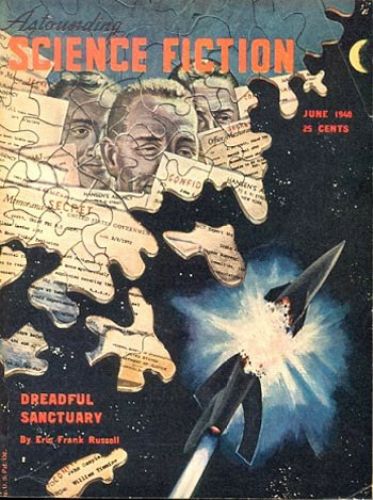Summary:
 Margaret writes her husband, Hank, (who may have been exposed to radiation) about their child. At first she worries about mutations. Later, she is pleased since infant can almost immediately speak. Her husband will learn something else, though, is (or, put another away, is not) afoot.
Margaret writes her husband, Hank, (who may have been exposed to radiation) about their child. At first she worries about mutations. Later, she is pleased since infant can almost immediately speak. Her husband will learn something else, though, is (or, put another away, is not) afoot.Discussion:When Hank comes home, Margaret is beside herself to impress Hank about their child. The child is put on her stomach to show Daddy how well she can crawl:
"The way you wriggle," he addressed his child sternly, as his hand touched a moving knob of flesh at the shoulder, "anyone might think you are a worm..."
When Hank unwraps, he learns she has no arms or legs. Margaret appears not to notice. He concludes, "Oh God, she didn't know."
This isn't exactly true. The title refers to the famous cliche: "[A face, etc.] that only a mother could love" usually referring to an ugly child. Does the mother know? Yes, but she's choosing to ignore defects and admire her child's more impressive attributes:
- "[S]he can evendo nice normal things other babies do.... Watch her crawl!"
- Margaret would not notice the tension.
- Margaret tried to get there first [to undo the child's clothes, presumably to prevent her husband from noticing].
- [After her husband gets glimmer something is wrong] Margaret stood and watched, smiling, "Wait till you hear her sing, darling--"
Margaret presents Hank with their daughter's positives first. She is ignoring the defects. Clearly, she has changed the diaper herself. When he starts to notice the physical abnormalities, she calls his attention to her other benefits. His horror and misunderstanding points to a second probable reading of the title: Only a mother could notice their child's other benefits. Not his use of the term "worm."
The story, printed three years after the bombing of Hiroshima, is preoccupied about the effects of all the potential mutants due to the dropping of nuclear bombs and other harmful effects of nuclear radiation.
As an author, Merril's reputation largely rests on this story. She is also known as an editor and champion of New Wave SF.

No comments:
Post a Comment